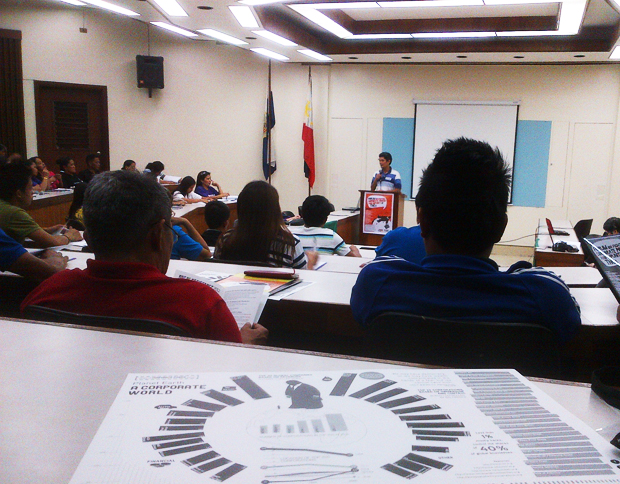“HUMAN DIGNITY over market profitability!”
This was the battle cry of the “Forum on Fighting Corporate Power and Impunity of Transnational Corporations (TNCs),” which was held at the Social Development Complex Conference Hall in the Ateneo last Monday, November 26.
Held to address the issue of corporate abuse and the impunity of TNCs, a good number of social movement organizations participated in the forum, including the Alliance of Progressive Labor (APL-Sentro), Nagkaisa, Jubilee South Asia Pacific and other Asia-based social movements.
The opening remarks emphasized the necessity of a movement to rebuild society based on an alternative paradigm centered on human dignity instead of profit. The possibility of the said paradigm shift was said to be dependent on the “struggle between Corporate Power and People Power.” The former, it was remarked, has been overpowering the latter.
Joseph Purganan from Focus on the Global South presented a paper entitled “Tackling Corporate Power in Asia.” He discussed the trends of excess in corporate power as well as case studies on the priority given to profit over environmental sustainability.
Set within the critical context of climate and human rights, the paper tackled three main topics:
– Policies biased for corporate interest instead of environment,
– Rise of Asian corporate power, and
– Corporate power and influence
Under the first issue, Purganan highlighted three main types of companies: resource extraction (mining, oil, natural gases), agribusiness (food processing, agrofeeds) and pharmaceuticals. He specified companies such as Exxon Mobil, Nestle and BHP Billiton as among the biggest corporations in the world involved in environmentally damaging practices.
China topped the list in Purganan’s discussion of the second topic. He cited the country’s domestic Shenhua Company, which is currently the largest coal-based mining enterprise in the world, producing about 45% of the world’s coal. In Asia, China accounts for about 73% of coal consumption.
Closely behind Shenhua is India’s state-owned Coal India, which controls over 80% of the country’s total coal production. According to Purganan, over 26,000 hectares of forestland have been diverted for coal mining since 2007.
Purganan then subcategorized the third main topic into economic power and the power to sue countries. He commented that Exxon Mobil’s market value is almost equal to the P1.8 trillion Philippine national budget. In addition, he pointed out that 41 of the world’s 100 largest economies are corporations.
This, Purganan said, perfectly sets up a corporation’s ability to bully and sue entire countries at will. He looked into the case of Churchill Mining Corporation vs. Indonesia as an example.
Churchill Mining, based in the United Kingdom (UK), claimed to have discovered a “world-class thermal coal deposit” in the East Kutai Regency of Kalimantan only to have its license repealed over a 75% interest in its East Kutai Coal Project, following the local government’s accusation of illegally cutting down protected forests.
Unable to challenge the accusation in Indonesian courts, Churchill brought the issue to the World Bank’s International Centre for Settlement of Investment Disputes for infractions against the Bilateral Investment Treaty between the UK and Indonesia.
After Purganan’s presentation came a series of personal sharing sessions by speakers who testified to the reality of corporate abuse and consequent impunity through their own experiences. Among them was Robina Poblador, a member of the B’laan tribe from the Saranggani Province in Mindanao. She said that the center of Sagittarius Mines, Inc. (SMI)-Xstrata project was Mt. Matutum, where a $5.9 billion gold and copper reserve was discovered. There now gapes an 800-meter deep hole to extract these resources.
Poblador said that SMI-Xstrata did not have legitimate consent from the local community. She further explained that SMI-Xstrata bribed the elders of the community into signing the memoranda of agreement with packed lunches. She also claimed that she was bribed with P50,000.
Poblador also accused the company of being behind the Tampakan massacre, where a woman pregnant for two months was killed along with her two other children. Teary-eyed, she glared at the audience and pleaded for help, calling for those with money and high positions to come to the aid of the needy.
Fr. Edwin Gariguez, who received international recognition for his struggles against mining in Mindoro, and a representative from KSPI or the Indonesian Trade Union Confederation, who talked about their disputes with Toyota in Indonesia, also shared their experiences.




